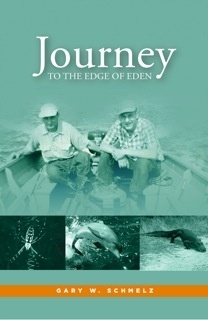Journey to the Edge of Eden
“The real voyage of discovery,” wrote Marcel Proust, “consists not in seeking new landscapes but in having new eyes.” In *Journey to the Edge of Eden—*a book that is part memoir and part call for environmental stewardship—marine biologist Gary Schmelz explores the Southwest Florida wilderness terrain with which he is personally and professionally familiar and shares stories about his beloved father, Henry.
The early chapters examine how a hardscrabble upbringing and economic challenges during the Depression imbued the elder Schmelz with a deep appreciation for life’s simple pleasures, most notably, a passion for fishing he enthusiastically shared with his son. That Henry fell for a manipulative woman who bitterly eschewed these pursuits makes it all the more admirable that the author remained so grounded, focused, and fair-minded. Wisely, Schmelz avoids a common mistake of many memoirists: engaging in retrospective psychoanalysis. Instead, he heeds his dad’s best piece of timeless wisdom: “A man with a good education can choose the kind of life he wants to lead. He can also live wherever he wants.”
The book’s strengths lie in Schmelz’s detailed descriptions of Southwest Florida’s otherworldly flora and fauna and his overarching environmental message of responsible stewardship. As his father noted, “If only people could see how beautiful marshes are, maybe they wouldn’t be so eager to destroy them.”
Education, Schmelz emphasizes throughout the book, is paramount to the preservation and protection of wildlife and natural systems. Supporting this view is his reference to The Life of Pi, in which the zoo director invites visitors to draw aside a curtain and view the world’s most dangerous animal: man. As part of an outreach educational program to promote and validate the work of the Big Cypress Nature Center in the 1970s, Schmelz recounts how his classroom visits revealed that children in urban settings who have never spent time outside their asphalt environments are just as baffled by Mother Nature’s diverse creatures as destitute children in rural areas who only see those same creatures as food.
Schmelz’s career as a marine biologist, with expertise in tides, weather patterns, and fossils, has served him well, and two-thirds of this book should be required reading for environmental analysts, researchers, and lobbyists. It’s the first third of the book, however, that suggests he doesn’t have a clear sense of his audience. Specifically, he spends excessive time relating events and anecdotes (about classmates, neighbors, and coworkers) that have little, if any, bearing on his core theme.
Dispersing the photographs throughout the book (rather than clumped in the center) would further entice prospective readers. Those shortcomings aside, Schmelz delivers a universal message that current and future generations cannot afford to ignore.
Reviewed by
Christina Hamlett
Disclosure: This article is not an endorsement, but a review. The publisher of this book provided free copies of the book and paid a small fee to have their book reviewed by a professional reviewer. Foreword Reviews and Clarion Reviews make no guarantee that the publisher will receive a positive review. Foreword Magazine, Inc. is disclosing this in accordance with the Federal Trade Commission’s 16 CFR, Part 255.

